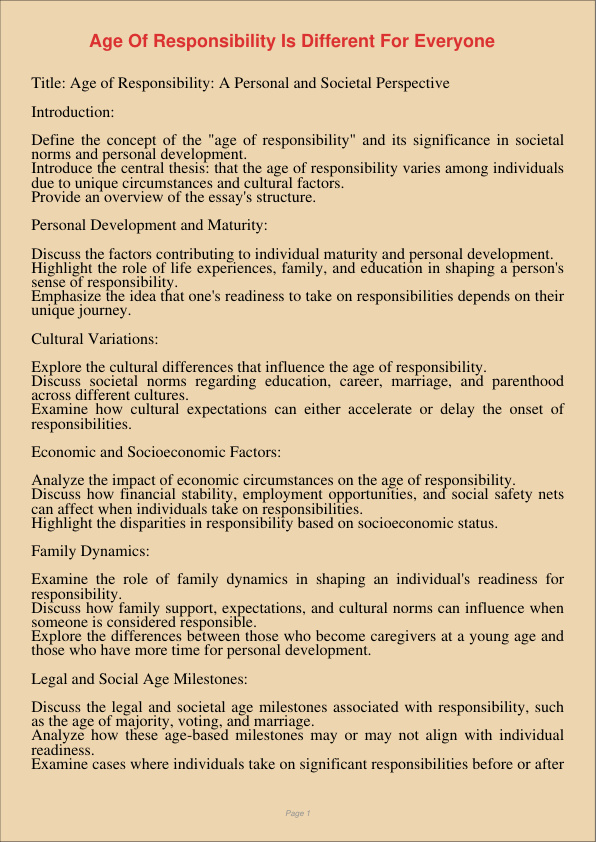Age Of Responsibility Is Different For Everyone
Jan 12, 2024
responsibility
everyone
History
Finance & Accounting

Title: Age of Responsibility: A Personal and Societal Perspective
Introduction:
Define the concept of the “age of responsibility” and its significance in societal norms and personal development. Introduce the central thesis: that the age of responsibility varies among individuals due to unique circumstances and cultural factors. Provide an overview of the essay’s structure.
Personal Development and Maturity:
Discuss the factors contributing to individual maturity and personal development. Highlight the role of life experiences, family, and education in shaping a person’s sense of responsibility. Emphasize the idea that one’s readiness to take on responsibilities depends on their unique journey.
Cultural Variations:
Explore the cultural differences that influence the age of responsibility. Discuss societal norms regarding education, career, marriage, and parenthood across different cultures. Examine how cultural expectations can either accelerate or delay the onset of responsibilities.
Economic and Socioeconomic Factors:
Analyze the impact of economic circumstances on the age of responsibility. Discuss how financial stability, employment opportunities, and social safety nets can affect when individuals take on responsibilities. Highlight the disparities in responsibility based on socioeconomic status.
Family Dynamics:
Examine the role of family dynamics in shaping an individual’s readiness for responsibility. Discuss how family support, expectations, and cultural norms can influence when someone is considered responsible. Explore the differences between those who become caregivers at a young age and those who have more time for personal development.
Legal and Social Age Milestones:
Discuss the legal and societal age milestones associated with responsibility, such as the age of majority, voting, and marriage. Analyze how these age-based milestones may or may not align with individual readiness. Examine cases where individuals take on significant responsibilities before or after these milestones.
Challenges and Consequences:
Examine the challenges and consequences of taking on responsibilities at different ages. Discuss the potential benefits and drawbacks of early or delayed responsibility, including impacts on mental health and personal development.
Gender and Responsibility:
Explore the intersection of gender and the age of responsibility. Discuss how societal expectations regarding traditional gender roles can influence when individuals take on specific responsibilities.
The Freedom to Choose:
Emphasize the importance of personal agency in determining when one feels ready to shoulder responsibilities. Discuss the significance of allowing individuals the autonomy to make choices about their own lives.
Conclusion:
Summarize the main points of the essay, highlighting the fluidity of the age of responsibility and the factors that influence it. Reiterate the central thesis that the age of responsibility is different for everyone, influenced by unique life experiences, cultural factors, and personal development. Encourage a more nuanced and empathetic understanding of individuals’ readiness for responsibilities in a diverse and complex world.